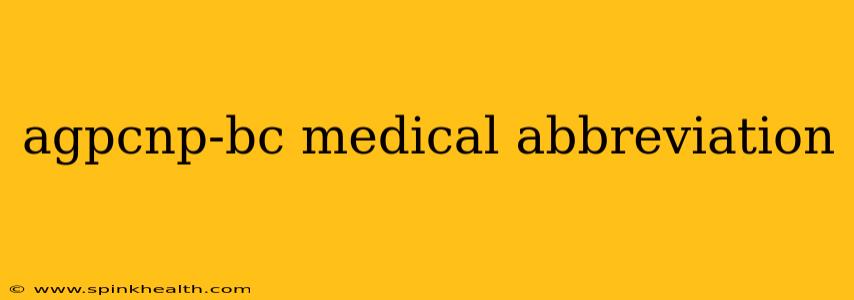Decoding the Medical Mystery: What Does AGPCNP-BC Stand For?
The medical world is filled with abbreviations, and sometimes deciphering them feels like cracking a code. Today, we're tackling one such abbreviation: AGPCNP-BC. For those unfamiliar, it might look like a jumbled mess of letters, but it represents a significant credential in the healthcare field. Let's unravel its meaning and explore what it signifies for patient care.
My journey to understanding this abbreviation started with a simple Google search. I was intrigued by the string of letters, and I wanted to know more about what it meant for individuals holding this title. My research revealed a fascinating story behind this designation, one that speaks volumes about advanced nursing practice and the ever-evolving landscape of healthcare.
What Does AGPCNP-BC Stand For?
AGPCNP-BC stands for Adult-Gerontology Primary Care Nurse Practitioner – Board Certified. This title indicates a highly skilled and experienced nurse practitioner who has specialized in providing primary care to adults and older adults. The "Board Certified" (BC) portion signifies that the individual has successfully passed a rigorous certification exam administered by a nationally recognized board. This certification assures patients that the nurse practitioner has met specific standards of education, experience, and competency in adult and geriatric primary care.
What Does an AGPCNP-BC Do?
The work of an AGPCNP-BC is multifaceted and vital. They play a crucial role in delivering comprehensive primary care, including:
- Comprehensive health assessments: They conduct thorough physical exams, assess patient health history, and order necessary diagnostic tests.
- Diagnosis and treatment of common illnesses: They diagnose and treat a wide range of acute and chronic conditions, providing evidence-based medical care.
- Prescribing medications: They are licensed to prescribe medications, ensuring patients receive appropriate and timely treatment.
- Preventive care: They educate patients on health promotion, disease prevention, and lifestyle modifications to maintain optimal health.
- Management of chronic conditions: They effectively manage chronic conditions such as diabetes, hypertension, and heart disease, working collaboratively with patients to achieve optimal health outcomes.
- Patient education and counseling: They provide crucial patient education and counseling on various health topics, fostering self-management skills and promoting overall wellbeing.
What is the Difference Between an AGPCNP-BC and Other Nurse Practitioners?
While all nurse practitioners have advanced nursing education, the "Adult-Gerontology Primary Care" specialization sets the AGPCNP-BC apart. Their extensive training equips them with the specific knowledge and skills needed to manage the complex health needs of adult and geriatric populations. This targeted training allows them to provide more specialized care and to understand the unique challenges faced by this patient demographic. Other nurse practitioner specializations may focus on other areas such as pediatrics, family medicine, or mental health.
How Do I Find an AGPCNP-BC?
Finding an AGPCNP-BC in your area might involve a simple online search using the credential "AGPCNP-BC" along with your location. You can also consult your primary care physician or health insurance provider for referrals. Many healthcare systems and clinics now actively employ AGPCNP-BCs to augment their primary care teams.
What are the educational requirements to become an AGPCNP-BC?
Becoming an AGPCNP-BC requires years of dedicated education and training. Aspiring practitioners typically need a master's degree or doctoral degree in nursing, followed by substantial clinical experience. The rigorous certification exam ensures that only those who meet the highest standards are awarded this credential.
In conclusion, the AGPCNP-BC credential represents a high level of expertise and signifies a commitment to providing exceptional primary care to adults and older adults. Understanding this abbreviation helps patients appreciate the scope of knowledge and skills these nurse practitioners bring to healthcare. It's a testament to the advanced role of nursing in the modern healthcare system.

